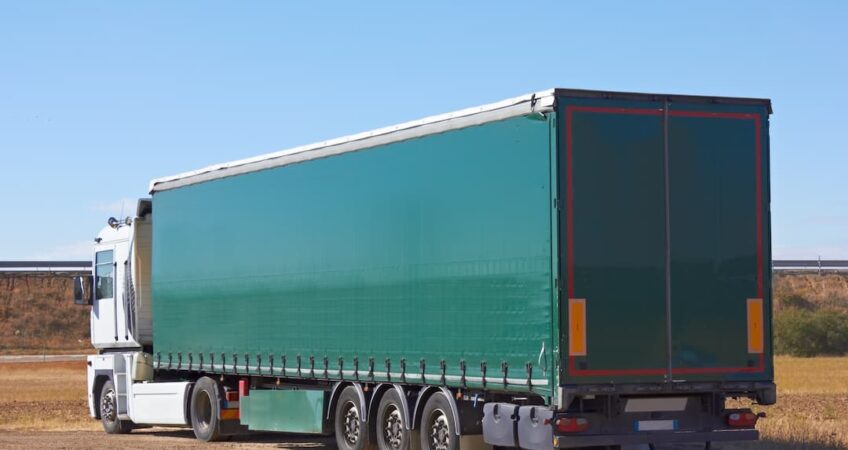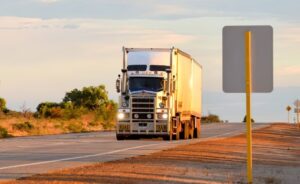
Clients often come to us wondering, “What is a full trailer and how does it differ from a semi trailer?”. Full trailers are used in a wide range of applications across Australia, including mining, agricultural, and construction industries.
In this guide, we’ll cover “what is a full trailer”, the differences between a full trailer and semi trailer, and when to use a full trailer. As leading experts in Australia’s heavy haulage industry, we’re here to help you make an informed decision on the right type of trailer for your needs.
What Is a Full Trailer?
A full trailer features both front and rear axles. Full trailers also feature a drawbar and coupling that get connected to the towing vehicle.
With independent axles, full trailers carry their own weight using the wheels and do not transfer additional weight to the towing vehicle. This ensures even weight distribution and minimises the load placed on the towing vehicle.
Common Uses in Australia
Full trailers are used in a wide variety of applications. In Australia, full trailers are often used to transport cargo over short distances. With their higher stability compared to semi-trailers, full trailers are ideal for situations when the towing vehicle is unable to bear additional weight.
Here are some of the common uses of full trailers in Australia:
- Mining
- Agriculture
- Construction
- Heavy machinery transport
- Forestry
- Short-distance, local cargo transport
Key Differences Between Full Trailers vs. Semi-Trailers
Connection Mode
- Full trailers: Full trailers use a drawbar and coupling mechanism. This connection mode offers flexibility and stability but does require precise alignment.
- Semi trailers: Semi trailers use fifth wheel coupling, offering good maneuverability and efficiency.
Design
- Full trailer: Full trailers have both front and rear axles and a drawbar.
- Semi trailers: Semi trailers do not have a front axle. The towing vehicle takes on a large portion of the towing weight.
Axles
- Full trailers: With independent axles and a drawbar, full trailers offer excellent flexibility, stability, and even load distribution.
- Semi trailers: Semi trailers have axles at the front of the trailer.
Applications
- Full trailers: With a high level of stability, full trailers are optimal for rough terrain.
- Semi trailers: Their versatility makes semi-trailers ideal for long-haul transportation.
| Full Trailer | Semi Trailer | |
| Connection Mode | Drawbar and coupling mechanism | Fifth-wheel coupling |
| Design | Independent axles and a drawbar; designed to haul heavy loads without making the towing vehicle handle additional weight | No axles at the front of the trailer; the towing vehicle takes on some of the hauling weight |
| Axles | At the front and rear end | All at the rear end |
| Applications | Rough, uneven, or off-road terrain; local haulage needs | Heavy haulage over long distances |
Pros and Cons of Full Trailers and Semi Trailers
Pros of Full Trailers
- Capable of carrying large volumes of cargo
- Ideal for transporting bulky materials or oversized loads
- Can be customized to accommodate a diverse range of cargo types
- Can have tie-down points, shelving, ramps, and additional features added
- High level of stability and even weight distribution
Cons of Full Trailers
- Requires a powerful towing vehicle
- The weight of a full trailer can reduce fuel efficiency
Pros of Semi Trailers
- More common, making it easier to find parts and services for
- High carrying capacity
- Single turning point makes for easier reversing
- Versatile and highly customisable
- Various trailer types available to fit the cargo needs
Cons of Semi Trailers
- Higher center of gravity increases the chance of tipping over
- Susceptible to jackknifing without proper driving technique
- Higher initial cost
- Higher fuel consumption
When to Use a Full Trailer vs. Semi Trailer
Choosing between a full trailer and semi trailer will depend on your transportation needs, the terrain, and transport distance.
With their high stability and even weight distribution, full trailers are often used for transporting heavy machinery or oversized loads over rough terrain. With both front and rear axles, full trailers offer higher flexibility and stability than semi-trailers. This makes them ideal for local deliveries and shorter transports.
We recommend a full trailer as your best option when:
- Stability is a top priority
- You are hauling heavy loads over rough or uneven terrain or off-road conditions
- Your towing vehicle cannot handle additional weight
- You need short distance transport to terminals, ports, factories, and warehouses
- Only a portion of the cargo is unloaded at each destination
We recommend considering a semi-trailer if:
- An entire load needs to be delivered to one destination
- Maneuverability and efficiency are priorities for the load transfer
- You need to haul heavier or larger loads
- You are involved in logistics or long-haul transportation
- You need a high level of versatility for varying cargo types
Benefits of Full Trailers for Australian Transport
Versatility and Load Capacity
With independent axles and even load distribution, full trailers are ideal for hauling heavy and bulky loads.
Stability and Safety
Full trailers offer a high level of stability and safety. This makes them ideal for both short and long-distance hauling needs. Full trailers are well suited to safely haul oversized or bulky loads over difficult or rough terrain.
Compliance and Regulations
General Mass Limits (GML) apply to all heavy vehicles in Australia, unless they qualify for an exemption or operate under appropriate accreditation. The Heavy Vehicle National Law (HVNL) is designed to keep drivers and road conditions safe.
We recommend this resource to learn more about Australian standards and legal requirements for heavy vehicles: National Heavy Vehicle Regulator: General Mass and Dimension Limits.
Why Choose Australia Wide Haulage?
Industry Expertise
With thousands of tonnes of heavy equipment and oversized loads safely delivered throughout Australia, our track record speaks for itself.
We are proud of the reputation we’ve earned as leaders and innovators in the heavy haulage industry. With our modern line haul fleet ranging from 90 to 167 tonne rated trucks and highly qualified drivers, we can transport over-size, over-length, and over-dimension loads safely and reliably.
Safety First Approach
We take pride in our safety record and are continually looking to further strengthen our safety strategies through:
- Ongoing training and continued education for all drivers and staff members
- Meticulous machine checks and maintenance of all trucks, trailers, and facilities
- Thorough documentation
- Continued compliance with all local regulations, Australian standards, and legal requirements
- Full accreditation with Main Roads
Comprehensive Transport Solutions
We offer comprehensive heavy haulage services that are tailored to your transport needs. With our own fleet of vehicles and highly trained drivers, we can customise services to ensure safe, seamless transport for your heavy haulage needs.
Ready to Move Heavy Loads with Confidence?
Full trailers are essential for construction, mining, agriculture, and other important industries in Australia. With their stability and versatility, full trailers are an ideal choice if you need goods transported over uneven terrain or across varying road conditions.
Contact Australia Wide Haulage today for reliable full truck load (FTL) transport solutions tailored to your needs. Request a quote now and let our expert team handle your logistics with precision and care!
Frequently Asked Questions
What is a full trailer used for?
Full trailers are primarily used for:
- Hauling heavy loads across uneven terrain or off-road transport
- Instances where stability is a top priority
- Hauling freight across shorter distances to local destinations
How is a full trailer different from a semi-trailer?
Full trailers feature a different design, coupling system, and weight distribution. Full trailers have independent axles, do not transfer weight to the towing vehicle, and offer a high level of stability.
What are the weight limits for full trailers in Australia?
In Australia, the maximum weight limit for a full trailer is 42,500 kg. This weight limit includes the weight of the container, truck, and cargo. The total weight of the cargo, truck, and container is the gross weight.
Learn more here: National heavy vehicle mass and dimension limits.
Are full trailers suitable for long-distance transport?
Yes, full trailers are suitable for long-distance transport. However, full trailers are commonly shorter trips and local transport. However, full trailers are highly customisable and may be the best option for long distance transport over uneven terrain or rough off-road conditions.
How do I hire a full trailer with Australia Wide Haulage?
Hiring a full trailer with Australia Wide Haulage is easy. Simply contact us for a transport quote or more information.

